Frutillar, nestled in the Los Lagos Region of Chile, exudes a charming blend of cultural heritage and natural beauty. Revered for its scenic views of Lake Llanquihue against the dramatic backdrop of the Osorno volcano, this quaint town is a blossoming nexus for classical music, epitomized by the renowned Teatro del Lago.
Visitors are treated to a serene landscape, rich German-influenced architecture, and a vibrant culinary scene that marries traditional German recipes with local ingredients, making Frutillar a unique destination for cultural and natural exploration.
For an enriching experience, plan your visit during the Frutillar Music Weeks held in January and February, when the town comes alive with orchestral performances and cultural activities.
Consider a stroll along the picturesque lakeside promenade, ideal for capturing stunning photographs of the volcano and enjoying the well-maintained gardens and historical landmarks.
Top things to do & see in Frutillar
Select the following sights and activities to discover best tickets and tours available in Frutillar.
Frutillar: A Symphony by the Lake
| Country | Chile |
| Time in Frutillar | GMT-4 |
| Language spoken | Spanish |
| Population | 15,403 (According to the National Statistics Institute of Chile, 2022) |
| Currency | Chilean Peso (CLP $) |
| Airports |
|
Frutillar, a charming city nestled by the shores of Lake Llanquihue in southern Chile, stands out for its profound German heritage evident in its architecture, customs, and yearly musical traditions. Historically established in 1856 by German colonists, Frutillar embodies a unique blend of Chilean and German cultures which is especially celebrated during the annual Weeks of German Music festival.
Where is Frutillar?
Frutillar is situated in the southern part of Chile, on the western bank of Lake Llanquihue in the Los Lagos Region.
Distances:
| Route | Distance by car | Time by car |
|---|---|---|
| Santiago to Frutillar | 621 miles (999 km) | Approx. 10 hours |
| Puerto Montt to Frutillar | 32 miles (52 km) | Approx. 50 minutes |
| Osorno to Frutillar | 55 miles (89 km) | Approx. 1 hour 15 minutes |
What is Frutillar famous for?
Frutillar is renowned for the “Semanas Musicales”, a music festival that features classical music performances near the scenic lakefront, celebrating both local and international musicians.
History
1856-1890: Settlement and Development
The history of Frutillar, located in the southern Chilean region of Los Lagos, begins when German immigrants settled the area in 1856. These settlers, invited by the Chilean government under its colonization policies aimed at populating the southern territories, introduced a wide array of European customs, architectures, and agrarian techniques to the region. Frutillar quickly flourished as a center of agriculture and cattle farming, laying the foundational economic structures that would define the town for decades.
1890-1940: Growth and Community Formation
By the early 20th century, Frutillar saw significant development in civic infrastructure and community institutions. Schools, churches, and community halls were established, many of which bore the architectural styles of Germany. During this period, the town also experienced an influx of cultural practices like orchestral music and German theatre, embedding a strong cultural identity that remains evident to this day.
1940-1990: Modernization and Conservation
Mid-20th century brought modernization to Frutillar, alongside the challenges of preserving cultural heritage amidst technological advancements and national political changes. The local economy began diversifying beyond traditional farming to include tourism, particularly around its natural landscapes and well-preserved German-style architecture.
1990-Present: Cultural Hub and Tourist Destination
In the late 20th and early 21st centuries, Frutillar emphasized its cultural offerings by inaugurating the Teatro del Lago, one of the most important and modern performing arts venues in Chile, which hosts international musical and artistic events. The town has embraced sustainable tourism, promoting its stunning lakeside views, historical sites, and cultural festivals, positioning itself as a vibrant destination in the southern Chilean itinerary.
Visit Frutillar
What to see and do in Frutillar
In Frutillar, visitors can immerse themselves in a blend of natural beauty and cultural heritage. Key attractions include:
- The Teatro del Lago: Experience world-class performances in this modern theatre that overlooks the picturesque Lake Llanquihue.
- Museo Colonial Alemán: Explore this museum to understand the life of German settlers and their cultural contributions to the region.
- Lake Llanquihue: Enjoy activities such as kayaking, swimming, or scenic walks along the lake’s extensive beaches.
- Local Culinary Experience: Taste the unique local cuisine, including kuchen and other German-derived delicacies.
Annual Events in Frutillar
Frutillar hosts several cultural events annually, most notably the “Semanas Musicales,” a music festival that takes place every summer. Attracting international musicians and thousands of visitors, it’s a vibrant time to experience the town’s cultural richness.
Best time to visit Frutillar
The best time to visit Frutillar is during the summer months from December to March when the weather is warmest and the musical festivals are in full swing, offering a lively atmosphere against the stunning backdrop of the Andes.
Is Frutillar worth visiting?
Frutillar is undoubtedly worth visiting for its unique combination of natural beauty and rich cultural heritage. The town offers a rare glimpse into Chilean-German history, impressive landscapes along Lake Llanquihue, and first-class cultural events like the Semanas Musicales.
Its tranquil, picturesque setting combined with its high-quality cultural offerings make Frutillar a must-visit destination in Chile.










